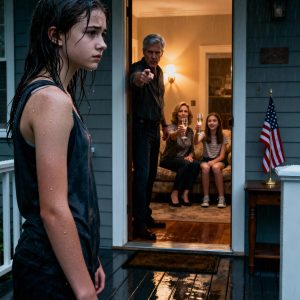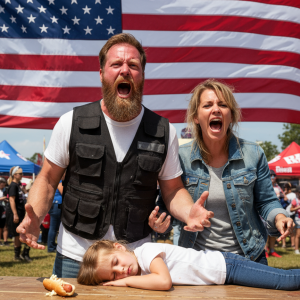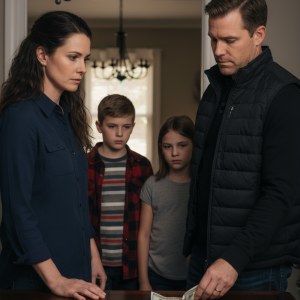I promised myself there’d be no tears today. My boots were already caked in mud, my stomach knotted from the shelter’s sour smell, and the signature I’d scrawled months earlier was supposed to make the break clean. No loose ends, no looking back.
Yet there he sat, tucked behind a sagging chain‑link gate—older, leaner, but unmistakably him. Diego.
This was the same pup who once dozed beneath my workbench and launched himself into my pickup as if he owned the place.
The attendant eyed me like I’d wandered in from the wrong side of town—tattoos, buzz cut, prison ink. But when I crouched and whispered, “Hey, D… remember me?” his ears pricked just as they used to at the crinkle of a cheese wrapper.
Diego shoved his head between the bars, trying to bury himself in my hands, forgiveness pouring out of him before I’d even earned it.
I should’ve walked out—that’s what every “expert” told me. Instead, I knelt there, letting him coat my fingers with slobbery absolution.
A volunteer finally approached and asked if I was okay. I told her the truth: I wasn’t—not since I’d signed him away, not since I walked out of those prison doors.
They couldn’t hand him over on the spot. Paperwork, protocols, proof of housing—they rattled off the rules. I pulled out a photo of my shoebox studio above a mechanic’s garage: a door, a mattress, and two bowls already waiting.
“Come back tomorrow,” they said. So I came back the next day. And the next. Seven straight sunrises.
I brought treats, chatted with staff, walked any mutt they handed me—just to stay close without looking desperate, though desperation buzzed in my chest like a broken phone.
Diego was the lone pure thing left from a life I’d pretty much scorched. The old me was gone—and that was probably a mercy—but Diego… he was hope on four legs.
Day five, they summoned me to the office. Application approved—with one catch: I had to attend their community classes on animal care.
They could’ve asked me to crawl over hot coals. Instead, I sat in a stuffy room beside tired moms, jittery teens, and one grouchy grandpa griping about “pampered pups.” We learned teeth brushing, leash manners, trauma triggers. I took furious notes.
All I pictured was Diego’s tail—wagging slow, tentative, willing itself to believe that happiness was safe again. I felt the same.
When I finally strode out with Diego trotting at my side, adoption papers tucked in my jacket, it felt like I’d hit the jackpot avoiding the police and finding gold in the same day.
At the corner store, the clerk blinked twice. “Diego? Thought that dog vanished.”
“Yeah,” I said, voice thick. “He’s home now.”
Home wasn’t all warm wins. Nightmares shook him awake—yelps, paws twitching. I’d drag a blanket to the floor, palm on his ribs until sleep settled back in. My demons kept the same schedule.
Healing came in inches. One quiet afternoon, I unclipped his leash at the park. He sniffed a tree, then scampered toward a toddler, dropping his tennis ball at her feet like she was an Olympic pitcher.
The mom—Natalia—smiled. “He’s gentle. Rescue?”
“More like… a reunion,” I said. One walk became two, coffee became dinner.
Three months later, I came home to a shattered window. TV gone, laptop gone—yet the empty pantry‑turned‑dog‑den gutted me most. Diego was missing.
I tore through the streets hollering his name. Neighbors mentioned a silver SUV, no plates. I plastered flyers, called every vet, every shelter. Natalia’s students hung posters at bus stops.
Weeks bled by. Sleep ditched me, appetite too. Then a vet two towns over rang: they’d scanned a microchip—Diego.
They found him limping along a roadside ditch, drenched and starved but breathing. Maybe he’d escaped, maybe the thieves dumped him, but he’d survived.
I careened down the highway. The moment I stepped into the clinic, he barked once, stumbled forward, and collapsed into my arms. This time, I vowed, I would never let go.
New locks, new cameras, no more lonely nights for either of us. Natalia moved in soon after, and together we built a crooked little fence the landlord tolerated only because I paid for every nail.
That squeaky upstairs room—paint peeling, floorboards whining—somehow transformed into home for all three of us.
If I hadn’t turned back to that shelter… if Diego hadn’t remembered me… I might still be sprinting from a past I can’t outrun. But he reminded me second chances aren’t handed out; they’re carved, one choice at a time.
So if you’re convinced you’ve blown your shot, listen: it’s never too late to do better. Sometimes the ones who know us at our worst help us grow into our best.
If this story warmed your heart, pass it on—you never know who’s waiting for a reason to hope today. 🐾💛





